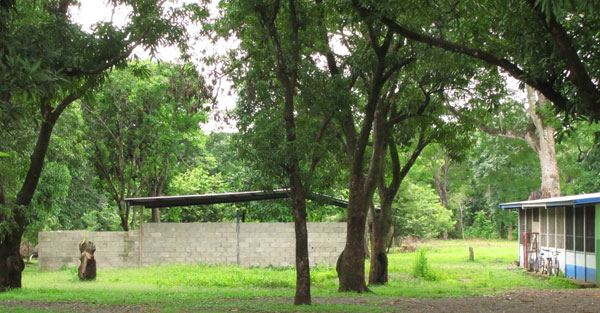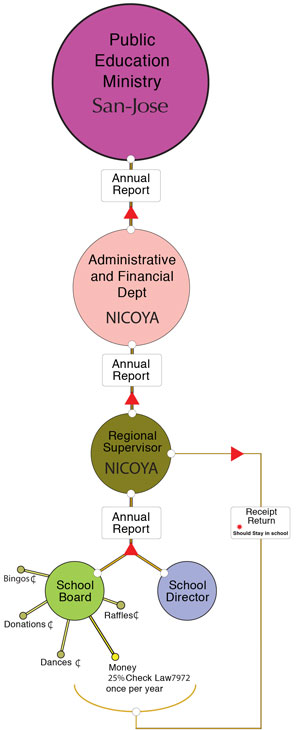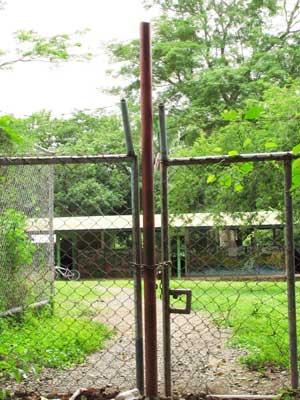• He’s accused of using checks with public funds
• Director argues that it’s a personal battle against him
In the month of March members of the Serapio López Fajardo School Board presented a penal denunciation against the school director for alleged fraudulent administration, falsification of public documents and use of false documents. This denunciation has divided the opinions of parents who send their children to the school, and the situation in the institution remains tense.

The cafeteria (left) is still in construction.
The opposing sides
Carmen Martínez Soza, who was elected School Board president for 2010, has two children in the school. She relates that she became a member of the Board initially in February 2009 and assumed the position of Vocal 1 (a voting member). “A father of a family from the school proposed to me that I participate on the Board and I agreed because there were many rumors about the Director and I wanted to confirm them.”
The Director, whose last name is Cárdenas, a native of Nicoya, has held his post for almost ten years. Despite having made numerous attempts to contact him to learn his opinion on the matter, we have found him unwilling to speak with the press.
The checks in conflict
In the School Board minutes from 2006, 2007 and 2008, there are records of only one meeting per year: one November 15, 2006, another November 17, 2007 and finally February 28, 2008. All of the meetings were presided over by the Director, just as determined by Ministry of Education regulations, and in two of the three meetings, Cárdenas told the Board about the needs of the school. This is his obligation because, as Director, he is the person who most knows what is needed. At the end of these annual meetings, the members of the board unanimously approved use of the annual funds received by means of a law known as the Cigarette and Liquor Law (#7972) to address the needs that Cárdenas mentioned.These funds generally are about a million colones and are deposited in the Board of Education’s account later to be disbersed by check. Despite the fact that, according to the minutes, all four the board members attended the meetings, only two members signed; and only one signature is repeated in all three meeting minutes, that of William Hernández Hernández, President of the Board during those three years.
In the first meeting held on November 15, 2006, the Board agreed to use the money from law 7972 with a check for 1,003,975 colones to start to build the school dining hall and they wrote a list of the construction materials to be bought. The check was cut November 24, 2006 and another meeting of the members was not held until November 17, 2007, one year later. In this second meeting, the Director Cárdenas recommended buying a freezer, rice cookers, blenders and office supplies with the money from law 7972 and, once approved, the check for 1,242,686 colones was cut the same month. Finally, in the third meeting of February 28, 2008, the Board of Directors was elected, and then the minutes were closed. No more Board meetings were recorded for 2008, but a check was cut for the amount of 1,187,108 colones on September 27.
Up until today, the school dining hall remains under construction and, according to the members of the current Board, it was they and a teacher with the help of the parents who started the construction about 18 months ago. |
|

Infographic by Nicholas Liger |
Cashing the checks
Olivier Gómez López, who was president of the school’s Board of Education during those three years, says that he didn’t know that there was a School Board at this time. “If so, I would have looked for them to do activities and raise funds since we (the Board of Education) were being told that we couldn’t look for money.” Gómez López as well as other parents interviewed don’t remember that a School Board existed during these years, nor do they remember being called to attend a public assembly to elect the members. However, since the money from law 7972 can be deposited only in the account of the Board of Education, the checks are signed by Gómez López. When asked if he knew about this law and the checks, he responded that “the only checks that I signed for these amounts were for the dining hall and they came in the name of the owner of the supermarket where the food for the dining hall is purchased.”
The checks also were signed by the Treasurer of the Board of Education, Cruz Paulino Díaz, who, upon being asked if he knew what this money was spent on, explained that “It’s up to the Board of Education and the School Board to supervise what happens to the funds, not me.” The receipts for these expenditures should be kept in the school archives and, once a year, they should be presented to the Regional Supervisor of MEP (the Ministry of Public Education) in Nicoya, Damarys Díaz Hernández, so she can prepare an annual report and turn it in to the Administrative and Finance Department of Nicoya. (see informational graphic)
Díaz Hernández says that she always presented the reports, that the receipts are in the school and that the Director will turn them in when the authorities ask for them.

One of the entrance gates to the Serapio Lopez school remains locked during classes. |
|
The penal denunciation
Based on the cashing of these checks, and since, according to the current School Board members, an “on-paper Board” existed between the years 2006 and 2009, on the 8th of last March, María Santos Zúñiga Díaz, president of the 2009 Board, presented a penal denunciation against the Director Cárdenas. However, the checks were written and were cashed by William Hernández Hernández. Then why the denunciation against the Director? Because, according to Carmen Martínez Sosa, “The Director always did what he wanted with William.”
Hernández Hernández is a 65-year-old man who works in the school as a security guard. He has participated in almost all of the school’s committees, organizations and activities. In an interview in his house, he confirms that he was the one who cashed the first two checks at the Banco Nacional (National Bank) and that the Director Cárdenas was with him; that together they went to buy “things for the school and nothing more” and that the Director has to have the receipts. “I told everything I knew to the Prosecutor when they called me to testify, I have nothing to hide and I know that everything will come to light.” Later, his voice cracks and he adds: “I am an honest and upright man; I would never steal from the kids.” |
In a letter dated December 16, which is well before the penal denunciation, the 2009 Board had already denounced him before the MEP early in 2009; Cárdenas responds to Damarys Díaz Hernández (Regional Supervisor) about the legality of the minutes book in the years 2006-2007 and 2008. “I am not making up information, at this moment I took the notes in a draft ledger and perhaps by negligence I didn’t turn them in in the book to the secretary (of the Board) to be copied over to the minutes.That doesn’t mean that this information is false… humans make mistakes,” and later on he continues, “in these moments, it’s my word against the three women of the School Board named in February of 2009, but the educational and administrative staff is witness that what appears in the minutes happened,” and he concluded, “I accept my error, I shouldn’t have taken on a function that wasn’t mine.” When, in December, Damarys Díaz asked Cárdenas to present the receipts that back up the expenditures of these checks, he responded that it was impossible to give them to her “due to the many hectic activities of the close of the school year, but they will be at your disposal once vacations begin (in February of 2010).”
The Resolution
Damarys Díaz Hernández investigated the case and, at the end of March, the Regional Director of Nicoya sent the investigation to the Department of Disciplinary Issues. It is up to them to evaluate the work of the Director. Upon asking Zeidy Palma Grijalva, Chief of Disciplinary Issues for MEP about the case, she responds by email that “the proceeding (of the denunciation)… has as its objective to establish the administrative disciplinary responsibilities that the educator in question could have incurred, but due to the matters being in process and until the proper corresponding procedures have been concluded, they haven’t been established yet.” In brief, MEP still is investigating and remains silent with the media.
The prosecutor, Karol Gómez of the Public Prosecution of Nicoya, who is in charge of the case, says that the investigation of the Prosecution is private and therefore won’t give information regarding it. The date of the case’s resolution is still uncertain, but as of the close of day of this issue (August 20), it’s known that the division of accounting crimes of OIJ (Organization of Judicial Investigation) is analyzing the minutes books.
 |
|

